OCD: 'If Liam had got the care he needed he would be here today'
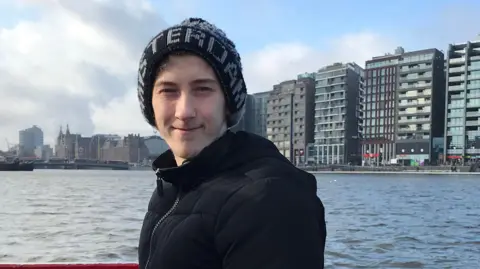 Michelle Arthur
Michelle ArthurAlmost all the plants Michelle Arthur shows me in her garden when we first meet were chosen by her son, Liam: a talented gymnast who won several championships in his teens and loved learning about the natural world.
"He definitely had green fingers," she tells me, adding that he dreamed of turning the garden into an orchard.
Now, the garden has become a tribute to her son. Placards bearing his name stand proudly on the lawn, under his favourite hawthorn tree.
Michelle believes that if he had been referred for specialist inpatient treatment for his obsessive-compulsive disorder (OCD), he would still be here today.
"The criteria that's set excludes the most vulnerable and disabled patients that are crippled by their OCD.
"They're the ones that need the help the most but they're the ones that fall through the net," she says.
Warning: this story deals with sensitive topics
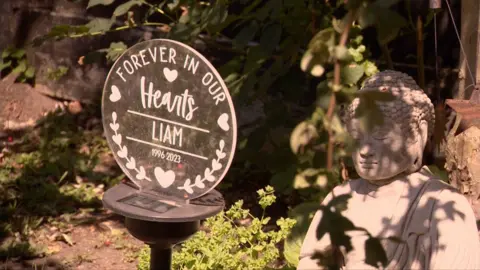
Struggling with grief after the loss of his grandad, Liam dropped out of university and came home, to Sutton in south London, in March 2017.
Michelle started to notice small changes in his behaviour, such as hoovering the house more frequently and rearranging items in the supermarket when they went shopping.
The severity of his symptoms only became clear to her when she once caught him washing his hands with diluted bleach.
Liam also began to become more secluded, avoiding friends and restricting his eating by going without food for four or five days in repeated cycles.
"He confessed to me that he felt he was infected and he had to carry out certain rituals and if he didn't carry out the rituals, his family would die or he would die."
In September 2018, Liam was assessed and diagnosed with OCD.
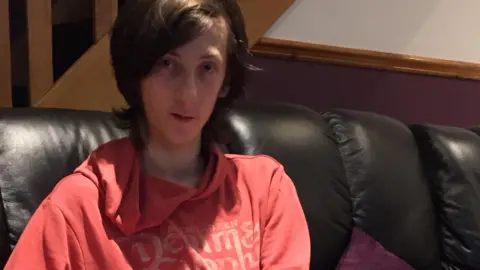 Michelle Arthur
Michelle ArthurWhat is OCD?
Obsessive-compulsive disorder is a common mental health condition that affects up to 2% of the UK's population, or about 1,300,000 people.
A person with OCD typically has obsessive, intrusive thoughts accompanied by compulsive behaviours.
Dr Amita Jassi, consultant clinical psychologist at the South London and Maudsley NHS Foundation Trust, says there's a misconception that OCD is predominantly about "contamination and cleaning", but it can involve a range of obsessions, such as religious or cultural customs.
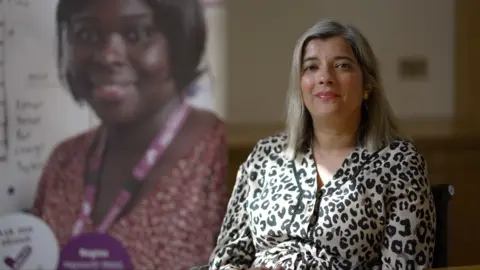
"When people say 'I'm a little bit OCD', that presses my buttons a bit," Dr Jassi says, adding that the condition is defined as a disorder because "it does have a distressing and interfering quality to it".
Dr Jassi stresses that OCD is "very treatable" and the symptoms are not always severe, but exist on a "spectrum", with many patients able to get on with their daily lives even though they may struggle with some tasks.
"But, sadly, sometimes it can be really devastating," she says, telling me that lots of the young people under the service's care are housebound as a result of severe worries about contamination or a need to carry out time-consuming rituals.
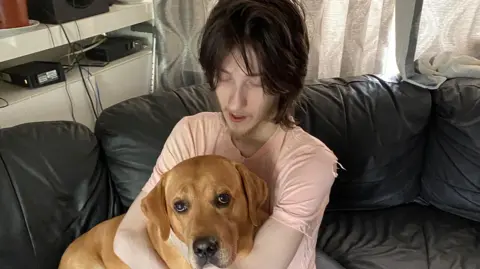 Michelle Arthur
Michelle ArthurLiam started cognitive behavioural therapy (CBT) with exposure and response prevention (ERP) - a common treatment for OCD - in July 2021.
It is a type of talking therapy that gradually exposes patients to the triggers for their compulsions and tries to help them change the way they react to them.
Initially, this helped his condition to improve.
"I wasn't able to cuddle my son or kiss him because he feared contamination and after one of the sessions I was able to give him a cuddle and it was fantastic," Michelle says.
But Liam struggled to engage consistently with treatment.
"He slowly went downhill as he found it quite hard," Michelle says, adding that he sometimes missed appointments, because he would be up for most of the night washing his hands and clothes.
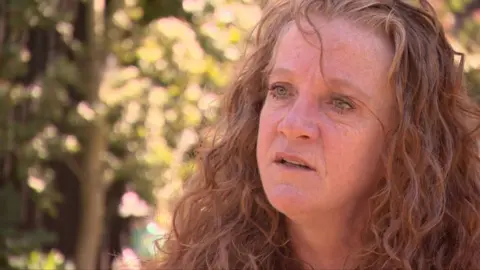
Because his compulsions included restricting what he ingested, he had difficulties regularly taking his medication as he feared it was infected.
He rapidly lost weight as he would go without food and water in "repeated cycles", Michelle says.
She tried to get Liam referred for specialist inpatient treatment, which was also recommended by his therapist, but was told that he did not meet the criteria for funding from NHS England.
This was because he did not meet the guidelines set by the National Institute for Health and Care Excellence, which describe a "stepped care" system, in which someone should be offered more intensive or specialised care after initial treatment is ineffective.
As Liam had only completed one trial of CBT with ERP and had only tried one type of SSRI (a type of antidepressant), he was told that he would not be eligible for funding and, even if he was, the waiting list was "significant".
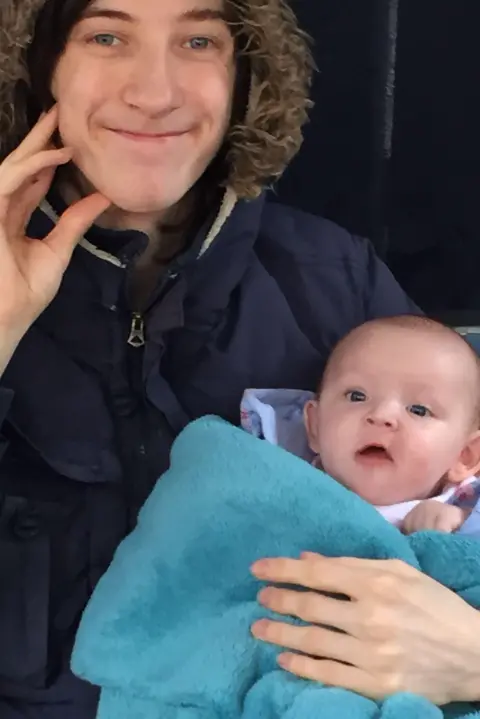 Arthur Family
Arthur FamilyIn June 2022, Liam had his last therapy session, in which he shared that he had been feeling suicidal - not for the first time.
"I think the next appointment he failed to keep, because Liam had been up all night washing his hands or showering and they decided to discharge him from the service."
Just under a year later, Liam took his own life.
A spokesperson for South West London and St George's Mental Health NHS Trust, which was responsible for administering Liam's care, said: "Our thoughts are with Liam's mother, family and loved ones at this very distressing time.
"We have completed a thorough investigation and will be working closely with the coroner in the lead-up to the inquest.
"We remain available to the family as a source of support."
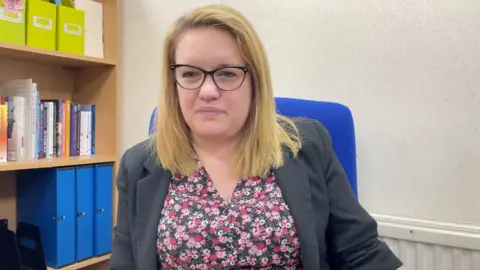
London-based charity OCD Action shares Michelle's concerns that people with severe symptoms of the condition are not getting the support they need.
CEO Leigh Wallbank says that for some of the most unwell people with OCD, the quality of care they receive is determined by "potluck" as "there is no consistent model of monitoring".
A recent survey by the charity Rethink Mental Illness suggests that this is not just the case with OCD: 35% of respondents in England said they were denied support from mental health services because their condition was considered "too severe".
Ms Wallbank argues that changing this is critical, especially as more and more people are approaching her charity for advice on OCD: they have seen a 51% rise in the number of young people contacting their helpline in the last six months, when compared to the same period last year.
"This is not just an oversight," she says, but proof of the "institutional trivialisation of OCD".
"It puts pressure on those providing care and leaves people with OCD without the treatment they need."
The BBC wrote to NHS England about Michelle's concerns regarding the criteria for care for OCD.
In response, an NHS spokesperson said "NHS England extends its deepest sympathies to the family of Liam Arthur.
"Our NHS talking-therapy service supports more than 1.2 million people a year, with the latest figures showing that nine in 10 people can access it within six weeks and, currently, more than two thirds make improvements after treatment – this service offers CBT therapy, which is the treatment recommended by clinical experts for obsessive-compulsive disorder.
"For those with severe mental illness for which talking therapies are not suitable, since 2019, NHS England has invested a record £1bn into expanding community mental health services and supported 100% of areas to have crisis resolution home treatment teams in place."
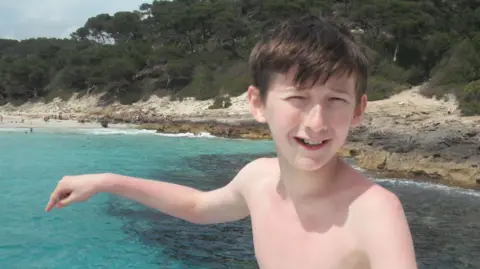 Arthur Family
Arthur FamilyA coroner's inquest into Liam's death will take place in July and an NHS safeguarding review into his care will also be carried out.
But Michelle says that structural change is still needed to ensure that people living with severe OCD get the support they need.
She has started a petition calling for the expansion of the only 24-hour inpatient ward in the UK for people struggling with OCD and BDD (body dysmorphic disorder), which at the moment only has 14 beds.
"I think there's currently about three quarters of a million people living with severe life-impacting OCD, just like Liam," she says.
"There's a lot of people out there suffering that need help and the help isn't there."
If you or someone you know needs more information, help is available on the BBC Action Line
